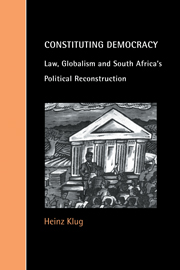Book contents
- Frontmatter
- Contents
- Acknowledgements
- Abbreviations
- Introduction
- 1 Post–Twentieth-Century Constitutionalism?
- 2 Legal Legacies and Constitutional Paths
- 3 Constitutionalism in Global Perspective
- 4 Constitutional Strategies
- 5 Constitutionalism in the Democratic Transition
- 6 Global Impact: International Imperatives and their Hybridization
- 7 The Constitutional Court and the Institutional Dynamics of Constitutionalism
- 8 Constitutional Imaginations and the Possibilities of Justice
- Conclusion
- Notes
- Bibliography
- Index
8 - Constitutional Imaginations and the Possibilities of Justice
Published online by Cambridge University Press: 06 July 2010
- Frontmatter
- Contents
- Acknowledgements
- Abbreviations
- Introduction
- 1 Post–Twentieth-Century Constitutionalism?
- 2 Legal Legacies and Constitutional Paths
- 3 Constitutionalism in Global Perspective
- 4 Constitutional Strategies
- 5 Constitutionalism in the Democratic Transition
- 6 Global Impact: International Imperatives and their Hybridization
- 7 The Constitutional Court and the Institutional Dynamics of Constitutionalism
- 8 Constitutional Imaginations and the Possibilities of Justice
- Conclusion
- Notes
- Bibliography
- Index
Summary
The adoption locally of a globally bounded notion of democratic constitutionalism both enables political reconstruction in the democratic transition and tests the capacity of the incorporated framework to address the conflicts arising from often irreconcilable political demands. The realm of bounded possibilities created by the introduction of constitutionalism is constantly infused with the incompatible constitutional imaginations of local contestants. The challenge in this context is whether constitutionalism may provide an institutional mechanism that would in effect civilize the political conflicts which until now have tended to degenerate into violent confrontation.
The creation and legitimation of a constitutional court provides a unique institutional site within which the process of mediation between alternative constitutional imaginations may be sustained. It creates the possibility that the judiciary in its role as ultimate interpreter of the Constitution will be able to sustain and civilize the tensions inherent in the repeated referral and contestation of essentially irreconcilable political differences. This chapter will explore how the introduction of constitutionalism creates a political space in which alternative and often irreconcilable visions may be pursued and contested. Focusing on particular struggles over participation, equality and social resources, I will seek to show how the constitutional aspirations of contesting forces may be simultaneously bounded and incorporated. I will argue that the impact of constitutionalism is to allow these different political factions the opportunity to continue to imagine their own place within a common constitutional future by keeping alive alternative spaces or possibilities of justice.
- Type
- Chapter
- Information
- Constituting DemocracyLaw, Globalism and South Africa's Political Reconstruction, pp. 160 - 177Publisher: Cambridge University PressPrint publication year: 2000



